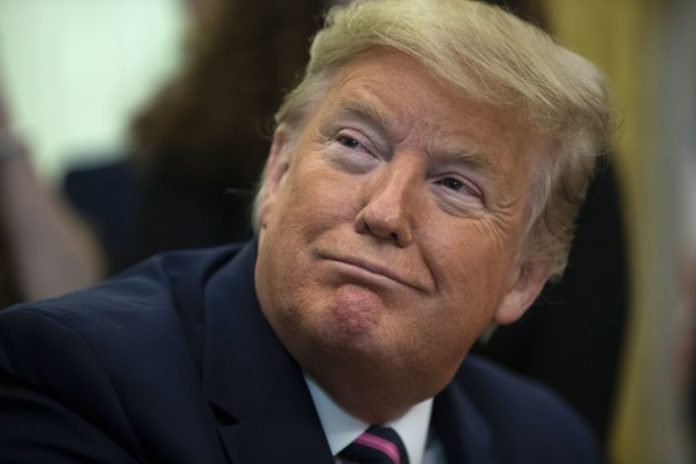By Jeph Ajobaju, Chief Copy Editor
A Washington elite of military top brass and former presidents have stood up to President Donald Trump over his plan to deploy United States troops on American soil to stop protests over police killing of George Floyd.
The murder of Floyd on May 25 in Minnesota is the latest high profile killing of unarmed African Americans by police, and the gruesomeness of it has ignited protests across all of the 50 states in the U.S. and across the world.
In a true Washington bombshell on June 3 evening, former Defence Secretary James Mattis, a warrior revered by his troops, told Americans they must come together without Trump.
And even as Trump threatens fire and brimstone, there are reports of police officers joining protesters in solidarity in several cities, and of white Americans realising for the first time the full impact of discrimination against blacks.
The indelible picture of the heartless killing of Floyd with a police officer kneeling on his neck while the victims mutters “I can’t breathe” has shocked all races in America, and beyond, just anyone with a conscience who values human life.
Across the Atlantic – 4,000 miles (6,400 kilometres) away from Minnesota – thousands massed on the streets again in London on June 3 to protest police injustice both in the U.S. and in the United Kingdom.
It was an escalation of the protest there on May 31.
Before Mattis, a retired general broke his silence, former Presidents Jimmy Carter, George W. Bush, Bill Clinton, and Barack Obama, all had voiced opposition to Trump’s tactics of divide and rule in the face of a national tragedy.
As CNN put it, Trump is facing an unprecedented revolt from the elite corps of former military leaders and presidents over his brazen response to mass protests and inflaming of racial divides.
“Donald Trump is the first president in my lifetime who does not try to unite the American people – does not even pretend to try,” said Mattis, who has kept silent since resigning as Trump’s defence secretary in 2018.
“Instead he tries to divide us. We are witnessing the consequences of three years of this deliberate effort. We are witnessing the consequences of three years without mature leadership,” said Mattis, a retired Marine general.
He criticised Trump in a statement for threatening to deploy regular troops to quell unrest in a flagrant threat to U.S. political stability.
According to CNN, the statement will come as a body blow to Trump, who although he latterly turned against his former defence secretary, idolises generals and loved referring to Mattis as “Mad Dog.”
It is particularly extraordinary since it appears to imply that an order by Trump for troops to deploy against protesters would be a breach of their constitutional oath.
Mattis conveying thoughts of serving senior officers?
And since former top military brass remain highly loyal to their comrades and plugged into the Pentagon, one of the most political of power centres, Mattis’ broadside will spark speculation as to whether he is conveying the thoughts of serving senior officers who are unable to speak out.
Trump’s initial reaction was to discredit Mattis, who served in combat roles in two Iraq wars and in Afghanistan but who Trump described on Twitter as “the world’s most overrated General.”
But, he notes, “His primary strength was not military, but rather personal public relations. I gave him a new life, things to do, and battles to win, but he seldom ‘brought home the bacon’.
“I didn’t like his ‘leadership’ style or much else about him, and many others agree. Glad he is gone!”
Abuse with a layer of religion
Also on June 3 evening, retired Gen. John Allen, the former commander of American forces in Afghanistan, took his own turn at attacking Trump’s response in a commentary published by Foreign Policy.
“It wasn’t enough that peaceful protesters had just been deprived of their first-amendment rights – this photo-op sought to legitimise that abuse with a layer of religion,” wrote Allen.
He was referring to the order given to federal security forces on June 1 to clear protesters from Lafayette Square before Trump emerged from the White House to stand in front of St. John’s Episcopal Church and hold a Bible aloft.
Allen winds up hoping this will all lead to a more enlightened America.
But, he notes, “it will have to come from the bottom up. For at the White House, there is no one home.”
The blasts from Allen and Mattis, who is far more cerebral than his nickname may imply, escalated a broadening front against Trump by Washington establishment elites outside the congressional Republican Party.
They came after Carter completed the roster of living former presidents who have stepped into a leadership void left by Trump as the nation experiences mass protests in the wake of the death of Floyd, a pandemic that has killed 109,176 Americans and a consequent economic meltdown.
Other senior military and political figures, including former Chairman of the Joint Chiefs of Staff, Mike Mullen, have also felt compelled to speak out as they perceive core American values threatened by an unchained commander in chief.
Trump not backing down
No modern president has faced such opprobrium from his predecessors or the men who have won their public respect in the heat of battle and served presidents of both parties.
Trump’s presidency is now slipping ever closer to an existential crisis, five months before he faces judgment from voters after a campaign that is threatening to tear at social and racial wounds as never before during his turbulent term.
But Trump – who made a political career out of bashing the establishment and torching presidential norms – is showing no sign of backing down.
On June 3 he lambasted “looters,” “hoodlums” and “terrorists” he claims are behind nationwide unrest.
His aides, meanwhile, concocted ever more outrageous propaganda to justify his behaviour, comparing his divisive stunt at a Washington church on June 1 to Winston Churchill in World War II and Bush after the September 11 attacks.
Trump is now furious with the current Defence Secretary, Mark Esper, who spoke out against his threat to invoke the Insurrection Act of 1807 to deploy troops inside the U.S.
The Pentagon chief is on thin political ice, as Trump’s conservative media enablers egg him on.
One ally, Republican Sen. Tom Cotton of Arkansas, demanded an “overwhelming show of force” in a New York Times op-ed in defiance of “delusional” local leaders.
June 3 brought another confusing whirl of fearful imagery with soldiers in combat fatigues on the streets of Washington and more looting in New York, though most protests across the country were increasingly peaceful.
There were also inspirational acts as Capitol Police knelt before protesters and stories emerged of some white Americans perceiving for the first time the prejudice experienced by their black compatriots.
There is a palpable feeling that the country is at a signature moment in its racial journey after the death of Floyd on May 25 with a policeman’s knee on his neck, the latest sign of brutality toward African Americans that has shocked all races.
There was also a glimpse of the politics of hope, as Obama implied that the answer to the tumultuous events of recent days was not the “domination” ordered by Trump but new motivation to turn protests into meaningful political change.
Obama also dismissed the idea that America has plunged into the misery of a 1968-style race and political nightmare, noting that the multi-ethnic crowds of protesters thronging U.S. streets were themselves a sign of dynamic progress.
“For those who have been talking about protests, just remember, this country was founded on protest. It is called the American Revolution,” Obama said in a Zoom call with his youth organisation, in an apparent indirect reference to Trump.
“And every step of progress in this country, every expansion of freedom, every expression of our deepest ideals, has been won through efforts that made the status quo uncomfortable.
“And we should all be thankful for folks who are willing in a peaceful, disciplined way to be out there making a difference,” he added.
Mattis angry, appalled
Mattis, a statesman soldier respected across political lines who is a hero to the troops he led in Iraq and elsewhere, had vowed to stay out of politics in retirement.
But his message made it clear that he could no longer hold his silence after watching a series of incidents he said had left him “angry and appalled.”
“We must not be distracted by a small number of lawbreakers. The protests are defined by tens of thousands of people of conscience who are insisting that we live up to our values – our values as people and our values as a nation,” Mattis wrote.
“When I joined the military, some 50 years ago, I swore an oath to support and defend the Constitution.
“Never did I dream that troops taking that same oath would be ordered under any circumstance to violate the Constitutional rights of their fellow citizens – much less to provide a bizarre photo op for the elected commander-in-chief, with military leadership standing alongside.”
“Militarising our response, as we witnessed in Washington, DC, sets up a conflict – a false conflict – between the military and civilian society.
“It erodes the moral ground that ensures a trusted bond between men and women in uniform and the society they are sworn to protect, and of which they themselves are a part,” Mattis wrote.
In another explosive passage, Mattis recalled the instructions sent to U.S. troops before they stormed the beaches of Normandy in 1944, implying that Trump had more in common with mortal US enemies than the traditions of American democracy.
“The Nazi slogan for destroying us … was ‘Divide and Conquer.’ Our American answer is ‘In Union there is Strength.’ We must summon that unity to surmount this crisis – confident that we are better than our politics,” he wrote.
The former defence secretary also implicitly criticised Esper, who referred to U.S. cities as “battle space,” a term he says he now regrets.
Silence as deadly as violence
Carter said “silence can be as deadly as violence” and called on Americans in positions of “power, privilege, and moral conscience” to fight racial discrimination, in his first public reaction to unrest surrounding the police killing of Floyd.
Bush and Clinton had previously issued statements calling on Americans to engage in self-examination about the country’s racial scars and to commit to building a new society.
But Trump continued on June 3 to portray protests across the nation following Floyd’s death as an uprising of radicals, as he presses home his hardline “law and order” election theme.
He tweeted that if people watched media coverage they would think that “killers, terrorists, arsonists, anarchists, thugs, hoodlums, looters, ANTIFA & others, would be the nicest, kindest most wonderful people in the Whole Wide World. No, they are what they are – very bad for our Country!”
However, the most significant statement of the day came from Mattis, a former general who may have the most capacity of any Washington elite to undermine Trump with the military that is at his command.













